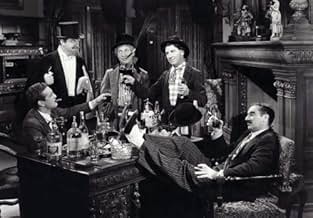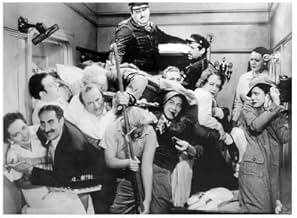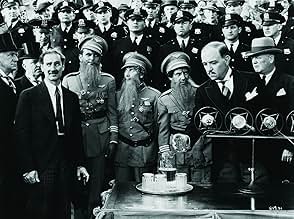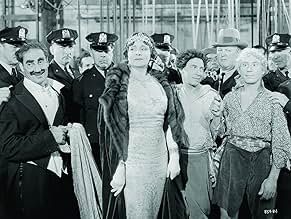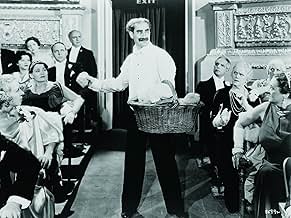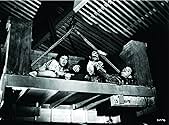IMDb-BEWERTUNG
7,8/10
35.750
IHRE BEWERTUNG
Ein gerissener Geschäftsführer und die beiden schrulligen Freunde von zwei Opernsängern verhelfen diesen zum Erfolg, indem sie deren spießige und versnobte Feinde demütigen.Ein gerissener Geschäftsführer und die beiden schrulligen Freunde von zwei Opernsängern verhelfen diesen zum Erfolg, indem sie deren spießige und versnobte Feinde demütigen.Ein gerissener Geschäftsführer und die beiden schrulligen Freunde von zwei Opernsängern verhelfen diesen zum Erfolg, indem sie deren spießige und versnobte Feinde demütigen.
- Auszeichnungen
- 3 wins total
Walter Woolf King
- Rudolfo Lassparri
- (as Walter King)
Sig Ruman
- Herman Gottlieb
- (as Siegfried Rumann)
Robert Emmett O'Connor
- Police Sergeant Henderson
- (as Robert Emmet O'Connor)
Enrique Acosta
- Nightclub Guest
- (Nicht genannt)
Harry Adams
- Opera Spectator
- (Nicht genannt)
Harry Allen
- Doorman
- (Nicht genannt)
Sam Appel
- Dungeon Guard
- (Nicht genannt)
King Baggot
- Dignitary
- (Nicht genannt)
Marion Bell
- Lady looking for 'Aunt Minnie'
- (Nicht genannt)
Edna Bennett
- Maid
- (Nicht genannt)
Dolly Blackburn
- Little Girl watching Harpo playing
- (Nicht genannt)
Zusammenfassung
Reviewers say 'A Night at the Opera' is celebrated for its iconic comedic routines and the Marx Brothers' unique blend of verbal and physical comedy. Groucho's wit, Chico's musical talents, and Harpo's slapstick humor are highlighted. Margaret Dumont's role and musical numbers add entertainment value, though some criticize their integration. The film is praised for its production quality and subversion of high society norms. However, a perceived shift towards more structured comedy marks the beginning of a decline in their later works.
Empfohlene Bewertungen
I didn't fully appreciate this film until my second viewing. Now I think it's one of the better Marx Brothers film. The film - filled with funny lines - has all the familiar MB trappings: good slapstick, good and bad jokes and routines, wild scenes, several musical numbers and general overall chaos.
The only thing not appealing to me in the film were some of the songs - not all, just some. Otherwise, it was all fun as Groucho, Chico and Harpo all share humorous lines and/or sight gags. Kitty Carlisle doesn't offer much in the way of a young beauty but it was still interesting to see her at this age as I had only known her through her "To Tell The Truth" television days. Alan Jones, meanwhile, is a pleasing singer and a nice guy, as always.
This is the film with the famous scene involving a ton of people being stuffed into Groucho's small cabin room. It's more amazing than funny. My favorite scenes were when Groucho and Chico got into discussions and trade lines back-and- forth. I also laughed heartily at the finale with Harpo swinging like Tarzan at the opera house.
In all, a funny MB film, one of the boys' better efforts. I play it with the English subtitles so as not to miss any of the great lines of dialog in here.
The only thing not appealing to me in the film were some of the songs - not all, just some. Otherwise, it was all fun as Groucho, Chico and Harpo all share humorous lines and/or sight gags. Kitty Carlisle doesn't offer much in the way of a young beauty but it was still interesting to see her at this age as I had only known her through her "To Tell The Truth" television days. Alan Jones, meanwhile, is a pleasing singer and a nice guy, as always.
This is the film with the famous scene involving a ton of people being stuffed into Groucho's small cabin room. It's more amazing than funny. My favorite scenes were when Groucho and Chico got into discussions and trade lines back-and- forth. I also laughed heartily at the finale with Harpo swinging like Tarzan at the opera house.
In all, a funny MB film, one of the boys' better efforts. I play it with the English subtitles so as not to miss any of the great lines of dialog in here.
I must admit that I am very light in personal knowledge of MArx Brothers films,and aside from the general information,imagery and quotes(the majority of which came from the irrepressible Groucho)that have been used and attributed in Western culture over the last seventy or eighty odd years,I have a very scant referential knowledge of their legendary body of film work.
With that in mind,when I saw the public library had a copy of this film in its stacks,it was a no-brainer for me. And it was a largely pleasing film experience as well.
The storyline seems to be somewhat insignificant: Brothers MArx are scattered about the goings on at a Venetian Opera company as it moves from Europe to New York City. They conspire to break a humble but talented tenor into the main role of the traveling show,as he is mooning over the young ingénue(Kitty Carlisle Hart,WELL before becoming the grand dame of TV Panel game shows!). But aside from the fair amount of music(hey,this IS,after all set in an Opera,so it goes to reason),this is mostly a physical comedy,laced with plenty of Groucho's standard one-liners. From watching his dealings with various straight people,from old stand-by MArgaret Dumont as his society-climbing wife,to the various lugs who signify authority(Theater directors,producers,society bigwigs,ship crew,policemen,local magistrates,etc.),Groucho is not only able to keep the humor legendarily fast and loose but also keeps the tempo of the dialog from bogging(I even noticed a sort of inspiration the creators at WArner Brothers got for Bugs Bunny from Groucho's witticisms!).
Maybe not the best of the Marxes films--though I still don't have a real gauge of opinion on this yet--but it's a fantastic starter film to build familiarity.
With that in mind,when I saw the public library had a copy of this film in its stacks,it was a no-brainer for me. And it was a largely pleasing film experience as well.
The storyline seems to be somewhat insignificant: Brothers MArx are scattered about the goings on at a Venetian Opera company as it moves from Europe to New York City. They conspire to break a humble but talented tenor into the main role of the traveling show,as he is mooning over the young ingénue(Kitty Carlisle Hart,WELL before becoming the grand dame of TV Panel game shows!). But aside from the fair amount of music(hey,this IS,after all set in an Opera,so it goes to reason),this is mostly a physical comedy,laced with plenty of Groucho's standard one-liners. From watching his dealings with various straight people,from old stand-by MArgaret Dumont as his society-climbing wife,to the various lugs who signify authority(Theater directors,producers,society bigwigs,ship crew,policemen,local magistrates,etc.),Groucho is not only able to keep the humor legendarily fast and loose but also keeps the tempo of the dialog from bogging(I even noticed a sort of inspiration the creators at WArner Brothers got for Bugs Bunny from Groucho's witticisms!).
Maybe not the best of the Marxes films--though I still don't have a real gauge of opinion on this yet--but it's a fantastic starter film to build familiarity.
Amusing and entertaining Marx picture , it has a lot of funny material and unfortunately intrusive songs . Groucho's wisecracks and the incomparable Chico and Harpo carry the movie . It deals with a sly business manager named Otis B. Driftwood (Groucho Marx) and two (Chico Marx as Fiorello and Harpo Marx as Tomasso) wacky friends of two (Kitty Carlisle as Rosa and Allan Jones as Ricardo) opera singers help them achieve success while humiliating their stuffy and snobbish enemies . Later on , Marx Brothers anarchize the opera , insulting and mocking the guests and players . Their actions include some on stage antics during the stage debut , as they arrange for the normal tenor to be absent so that the young lover named Ricardo can get his chance .
Classic Marx film with many funny sequences , this is the most sustained bit of insanity , full of crazy gags , antics and amusement , being now deemed a satiric masterpiece ,and one of the biggest hits . Although it suffers from staginess and musical comedy plotting but gives the zany threesome plenty of comic elaboration . Enough gags for give several movies , but our favorite is still the cabin scene . Despite the abundant songs and silly as well as sappy love story the movie maintains itself very well . This is a fun comedy as hilariously amusing as the films they made at Paramount with Zeppo . This is a M.G.M production lavishly financed by Irving Thalberg . Excellent Harpo Marx , as usual , he even did many of his own stunts , he later said it was a silly thing for a 47-year-old non-stuntman to have done . Groucho said that this was his favorite among his movies . The Marx Bros (minus Zeppo) are in peak form in this vintage musical comedy with co-star the legendary Margaret Dumont , including sparkling dialogs with Groucho . Furthermore , Sig Ruman makes his first of three appearances in The Marx Brothers films. However , this is the first Marx Brothers film made without brother Zeppo Marx, it started a new trend of The Marx Brothers movies featuring a Zeppo-like supporting character who carries the love story and sings the song . The motion picture was well directed by Sam Wood . Sam Wood, freshman The Marx Brothers director in this film, was a perfectionist , the scene in which Harpo Marx hangs from the rope was filmed so many times that Harpo Marx's hands became cut and swollen from the rope . Don't miss it , one of the funniest picture ever made by Marx Brothers
Other important films starred by Marx Brothers -many of them Broadway farce plays transfered by scenarists into vehicle for the Brothres- , they are the followings : ¨Animal crackers¨, ¨Duck soap¨ that was a flop when first released but today considered a masterpiece , ¨Horse Feathers¨, ¨At the circus¨, ¨Day at the races¨ , ¨Room service¨ , ¨Go West¨, ¨Love Happy¨ and ¨Night in Casablanca¨, though in 1946 the Marx formula was wearing thin . Any film with Groucho , Chico , Harpo and Zeppo is well worth seeing .
Classic Marx film with many funny sequences , this is the most sustained bit of insanity , full of crazy gags , antics and amusement , being now deemed a satiric masterpiece ,and one of the biggest hits . Although it suffers from staginess and musical comedy plotting but gives the zany threesome plenty of comic elaboration . Enough gags for give several movies , but our favorite is still the cabin scene . Despite the abundant songs and silly as well as sappy love story the movie maintains itself very well . This is a fun comedy as hilariously amusing as the films they made at Paramount with Zeppo . This is a M.G.M production lavishly financed by Irving Thalberg . Excellent Harpo Marx , as usual , he even did many of his own stunts , he later said it was a silly thing for a 47-year-old non-stuntman to have done . Groucho said that this was his favorite among his movies . The Marx Bros (minus Zeppo) are in peak form in this vintage musical comedy with co-star the legendary Margaret Dumont , including sparkling dialogs with Groucho . Furthermore , Sig Ruman makes his first of three appearances in The Marx Brothers films. However , this is the first Marx Brothers film made without brother Zeppo Marx, it started a new trend of The Marx Brothers movies featuring a Zeppo-like supporting character who carries the love story and sings the song . The motion picture was well directed by Sam Wood . Sam Wood, freshman The Marx Brothers director in this film, was a perfectionist , the scene in which Harpo Marx hangs from the rope was filmed so many times that Harpo Marx's hands became cut and swollen from the rope . Don't miss it , one of the funniest picture ever made by Marx Brothers
Other important films starred by Marx Brothers -many of them Broadway farce plays transfered by scenarists into vehicle for the Brothres- , they are the followings : ¨Animal crackers¨, ¨Duck soap¨ that was a flop when first released but today considered a masterpiece , ¨Horse Feathers¨, ¨At the circus¨, ¨Day at the races¨ , ¨Room service¨ , ¨Go West¨, ¨Love Happy¨ and ¨Night in Casablanca¨, though in 1946 the Marx formula was wearing thin . Any film with Groucho , Chico , Harpo and Zeppo is well worth seeing .
Groucho Marx is in his element as slick, fast talking business manager Otis B. Driftwood, who spends his time playing up to arts patron Mrs. Claypool (classic Marx Bros. foil Margaret Dumont). When he sees that she's willing to pony up $1,000 a night to have pompous Lassparri (Walter Woolf King) sing, he wants a piece of the action. Circumstance soon throws him together with equally sly Fiorello (Chico) and goofy Tomasso (Harpo), as they become determined to help out young lovers & aspiring opera stars Rosa (Kitty Carlisle) and Ricardo (Allan Jones).
Even if one is not a fan of the opera, they shouldn't let that dissuade them from checking out the Marx Bros. in their glory. Some buffs consider this their best film, and it certainly shows off their talents to memorable effect. Musical interludes do go on a bit long, but the quality of the comedy when it occurs is top notch. There are some truly great bits in here, like the "party of the first part" contract, the overcrowded (to say the least) stateroom sequence, and the frantic, farcical efforts of Otis, Fiorello, Tomasso, and Ricardo to pull the wool over the eyes of a suspicious inspector (Robert Emmett O'Connor) by moving beds from one room to another.
Groucho is hilarious, as always. Very few entertainers in film history can fire off a one-liner as snappily as he does. Chico and Harpo have their wonderful moments, as well. (It's such a hoot when Harpo does a Spider-Man routine near the end.) Carlisle and Jones are extremely appealing, Dumont is once again a fine "straight woman", King is an appropriately snooty villain, Sig Ruman is superb as eternally frustrated Gottlieb, and O'Connor is likewise good as the antics of Otis and company take a toll on him.
The pace isn't always consistent, but there is some enjoyable action and first rate stunt work. Overall, this is a solid comedy / musical that will appeal to any lover of this era in cinema.
Eight out of 10.
Even if one is not a fan of the opera, they shouldn't let that dissuade them from checking out the Marx Bros. in their glory. Some buffs consider this their best film, and it certainly shows off their talents to memorable effect. Musical interludes do go on a bit long, but the quality of the comedy when it occurs is top notch. There are some truly great bits in here, like the "party of the first part" contract, the overcrowded (to say the least) stateroom sequence, and the frantic, farcical efforts of Otis, Fiorello, Tomasso, and Ricardo to pull the wool over the eyes of a suspicious inspector (Robert Emmett O'Connor) by moving beds from one room to another.
Groucho is hilarious, as always. Very few entertainers in film history can fire off a one-liner as snappily as he does. Chico and Harpo have their wonderful moments, as well. (It's such a hoot when Harpo does a Spider-Man routine near the end.) Carlisle and Jones are extremely appealing, Dumont is once again a fine "straight woman", King is an appropriately snooty villain, Sig Ruman is superb as eternally frustrated Gottlieb, and O'Connor is likewise good as the antics of Otis and company take a toll on him.
The pace isn't always consistent, but there is some enjoyable action and first rate stunt work. Overall, this is a solid comedy / musical that will appeal to any lover of this era in cinema.
Eight out of 10.
A NIGHT AT THE OPERA (MGM, 1935) directed by Sam Wood, re-introduces the Marx Brothers to the screen following their five years at the Paramount studio (1929-1933) to MGM, this being the start of a new beginning and the end to their wild world of comedy. It also brings forth their most popular comic foil of all, Margaret Dumont, from their Broadway to Paramount days, and the return to a formula story and time out for musical interludes either by the brothers or the romantic lovers originally done in their initial films of THE COCOANUTS (1929) and ANIMAL CRACKERS (1930). Aside from now being The Three Marx Brothers (Zeppo who has since retired), their characters have been toned down a bit, which helps. However, at MGM, with this, their best film for the studio, Groucho and Harpo become victims instead of instigators, with such notable scenes as Harpo employed as a dresser for an abusive opera tenor (Walter Wolfe King) who slaps, hits and uses a whip on him (at one point off camera) whenever getting out of line with his buffoonery, and Groucho, who always wins out in every situation physically and verbally, getting kicked down four flights of stairs, which indicates they are not always indestructible, yet remain in character from the old days whenever possible. Chico retains his wiseacre Italian character, remaining notably the same from his previous efforts, however, things will start to change not for the better for him and his brothers in the movies to follow.
Plot summary: Introduction takes place in Milan, Italy, where Otis B. Driftwood (Groucho) agrees to represent dowager Mrs. Claypool (Margaret Dumont) into society by arranging for her to invest $200,000 to Herman Gottlieb (Sig Ruman), director of the opera company so that he can afford to bring opera singers Rudolpho Lassparri (Walter King) and Rosa Castaldi (Kitty Carlisle) to New York City. Rudolpho loves Rosa, but she is more interested in Ricardo Baroni (Allan Jones), an unknown singer working as a chorus-man, but with the help of Fiorelli (Chico), acting as his manager, and his partner, Tomasso (Harpo), the trio head for America by becoming stowaways on the S.S. Americus, hiding out in Driftwood's tiny stateroom in order for Ricardo to get his big chance as a singer. After Driftwood and his cronies arrive in at the Metropolitan Opera House, thanks to them in disrupting Rudolpho's performance that the art of opera will never be the same again.
The musical program: "Alone" (sung by Kitty Carlisle and Allan Jones) by Nacio Herb Brown and Arthur Freed; "Cosi-Cosa" (sung by Allan Jones) by Bronislau Kaper, Walter Jurmann and Ned Washington; "All I Do is Dream of You" (by Brown and Freed/piano solo by Chico Marx); "Alone" (harp solo by Harpo Marx); and selections from Il Trovatore by Guiseppi Verdi: "Di quella pira," "Miserere," "Anvil Chorus," "Stride la Vampa" "Strido lassu" and "Miserere." Allan Jones and Kitty Carlisle doing their duet, "Alone," him on the pear and she from the boat dock, Chico's fast finger piano playing, and Harpo's harp solo in a serious manner as he performs to a little old lady (facial shadow front only) who looks on approvingly, may not be highlights, but are truly memorable moments.
Highlights: Whenever anyone goes into discussion regarding A NIGHT AT THE OPERA, the first thing that comes immediately to mind is that famous state room scene involving Groucho, Chico and the sleeping Harpo, with various others involved, crammed together until the door opens, having them all falling out like dominoes. This hilarious bit is one that's remembered best with fondness and admiration. However, there are others worth noting: The opening where Dumont awaits for Groucho at a restaurant for an hour only to find him at the table behind her eating with another lady, is priceless; Groucho and Chico contract exchanges that becomes a "sanity clause"; arrested stowaway Harpo's attempt in escaping his detention cabin by crawling out of a porthole and hanging onto a rope outside only to be dumped into the ocean; Jones, Chico and Harpo in bearded disguises posing as celebrity aviators to give speeches on coast-to-coast radio, with the silent Harpo covering up his muteness by constantly drinking glasses of water; the disappearance of beds in Groucho's hotel room while the plainclothesman detective (Robert Emmett O'Connor) investigates; and of course, the climactic opera chaos by the Marxes, with one great bit with the orchestra playing the overture to "Take Me Out to the Ball Game" after coming to the page with the planted song sheets, with Groucho acting as a vendor yelling "Peanuts! Peanuts!" to the patrons. A classic with Callas.
The supporting players: Newcomer Allan Jones steps in for the role that might have been offered to Zeppo. He is a likable actor with a fine singing voice who performs well opposite Kitty Carlisle (another recruit from Paramount and rare screen appearance, being best known as the TV panelist in the long running quiz show, "To Tell the Truth").
Footnote: It is quite evident that prints that have been circulating since commercial television days isn't complete. Missing footage is quite evident during the opening minutes of the story where the movie originally began with a musical number prior to the restaurant scene involving Groucho and Dumont. At present, this, along with other cut footage, no longer exists. Timed at 96minutes, the 90 minute version is the one available on Turner Classic Movies, VHS and DVD formats. Maybe one of these years a completely restored print of A NIGHT AT THE OPERA will suffice, but for now, this will have to do.
In closing: Get out those opera glasses and have yourself a grand night at the opera. (***1/2)
Plot summary: Introduction takes place in Milan, Italy, where Otis B. Driftwood (Groucho) agrees to represent dowager Mrs. Claypool (Margaret Dumont) into society by arranging for her to invest $200,000 to Herman Gottlieb (Sig Ruman), director of the opera company so that he can afford to bring opera singers Rudolpho Lassparri (Walter King) and Rosa Castaldi (Kitty Carlisle) to New York City. Rudolpho loves Rosa, but she is more interested in Ricardo Baroni (Allan Jones), an unknown singer working as a chorus-man, but with the help of Fiorelli (Chico), acting as his manager, and his partner, Tomasso (Harpo), the trio head for America by becoming stowaways on the S.S. Americus, hiding out in Driftwood's tiny stateroom in order for Ricardo to get his big chance as a singer. After Driftwood and his cronies arrive in at the Metropolitan Opera House, thanks to them in disrupting Rudolpho's performance that the art of opera will never be the same again.
The musical program: "Alone" (sung by Kitty Carlisle and Allan Jones) by Nacio Herb Brown and Arthur Freed; "Cosi-Cosa" (sung by Allan Jones) by Bronislau Kaper, Walter Jurmann and Ned Washington; "All I Do is Dream of You" (by Brown and Freed/piano solo by Chico Marx); "Alone" (harp solo by Harpo Marx); and selections from Il Trovatore by Guiseppi Verdi: "Di quella pira," "Miserere," "Anvil Chorus," "Stride la Vampa" "Strido lassu" and "Miserere." Allan Jones and Kitty Carlisle doing their duet, "Alone," him on the pear and she from the boat dock, Chico's fast finger piano playing, and Harpo's harp solo in a serious manner as he performs to a little old lady (facial shadow front only) who looks on approvingly, may not be highlights, but are truly memorable moments.
Highlights: Whenever anyone goes into discussion regarding A NIGHT AT THE OPERA, the first thing that comes immediately to mind is that famous state room scene involving Groucho, Chico and the sleeping Harpo, with various others involved, crammed together until the door opens, having them all falling out like dominoes. This hilarious bit is one that's remembered best with fondness and admiration. However, there are others worth noting: The opening where Dumont awaits for Groucho at a restaurant for an hour only to find him at the table behind her eating with another lady, is priceless; Groucho and Chico contract exchanges that becomes a "sanity clause"; arrested stowaway Harpo's attempt in escaping his detention cabin by crawling out of a porthole and hanging onto a rope outside only to be dumped into the ocean; Jones, Chico and Harpo in bearded disguises posing as celebrity aviators to give speeches on coast-to-coast radio, with the silent Harpo covering up his muteness by constantly drinking glasses of water; the disappearance of beds in Groucho's hotel room while the plainclothesman detective (Robert Emmett O'Connor) investigates; and of course, the climactic opera chaos by the Marxes, with one great bit with the orchestra playing the overture to "Take Me Out to the Ball Game" after coming to the page with the planted song sheets, with Groucho acting as a vendor yelling "Peanuts! Peanuts!" to the patrons. A classic with Callas.
The supporting players: Newcomer Allan Jones steps in for the role that might have been offered to Zeppo. He is a likable actor with a fine singing voice who performs well opposite Kitty Carlisle (another recruit from Paramount and rare screen appearance, being best known as the TV panelist in the long running quiz show, "To Tell the Truth").
Footnote: It is quite evident that prints that have been circulating since commercial television days isn't complete. Missing footage is quite evident during the opening minutes of the story where the movie originally began with a musical number prior to the restaurant scene involving Groucho and Dumont. At present, this, along with other cut footage, no longer exists. Timed at 96minutes, the 90 minute version is the one available on Turner Classic Movies, VHS and DVD formats. Maybe one of these years a completely restored print of A NIGHT AT THE OPERA will suffice, but for now, this will have to do.
In closing: Get out those opera glasses and have yourself a grand night at the opera. (***1/2)
Wusstest du schon
- WissenswertesIn exasperation after several attempts to have Groucho Marx read one of his lines in the manner director Sam Wood had requested, Wood exclaimed, "I guess you just can't make an actor out of clay." Groucho Marx instantly responded, "Nor a director out of Wood."
- PatzerRicardo is clearly standing on the dock as the ship pulls away, yet he turns up on board later as a stowaway.
- Zitate
Otis B. Driftwood: It's all right, that's in every contract. That's what they call a sanity clause.
[Fiorello laughs loudly]
Fiorello: You can't fool me! There ain't no Sanity Claus!
- Alternative VersionenAll references to the first portion of the film taking place in Italy were edited from the original negative sometime after the original release. There is speculation that this was done during WWII when Italy was as Axis power, but it also may have been done in the late 1930's to appease Mussolini, who didn't like the way Italians were being portrayed. Either way, the film's first scene begins rather abruptly and is missing a musical number and references to Milan, Italy.
- VerbindungenEdited into Apaga y vámonos: Folge #1.5 (2013)
- SoundtracksIl Trovatore: Di quella pira
(1853) (uncredited)
Music by Giuseppe Verdi
Libretto by Leone Emanuele Bardare and Salvatore Cammarano
Sung by Walter Woolf King
with The MGM Symphony Orchestra
Top-Auswahl
Melde dich zum Bewerten an und greife auf die Watchlist für personalisierte Empfehlungen zu.
Details
- Erscheinungsdatum
- Herkunftsland
- Sprachen
- Auch bekannt als
- A Night at the Opera
- Drehorte
- Produktionsfirma
- Weitere beteiligte Unternehmen bei IMDbPro anzeigen
Box Office
- Weltweiter Bruttoertrag
- 8.200 $
- Laufzeit1 Stunde 36 Minuten
- Farbe
- Seitenverhältnis
- 1.37 : 1
Zu dieser Seite beitragen
Bearbeitung vorschlagen oder fehlenden Inhalt hinzufügen

Oberste Lücke
By what name was Skandal in der Oper (1935) officially released in India in English?
Antwort


